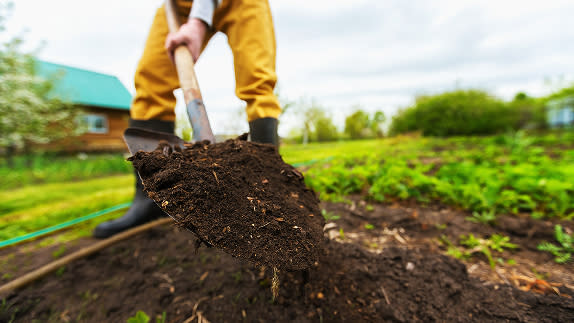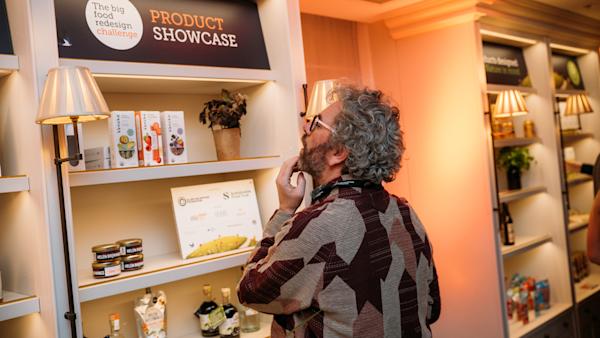To truly transform the food system, we need retailers to sell food that enables nature to thrive.
In this episode, learn how leading retailers from around the world are embracing circular design for food, and facing the challenges that occur on the journey.
Our guests are Helly McAlister, Senior Buyer at Fortnum & Mason, and Susy Yoshimura, Senior Sustainability Director at Grupo Carrefour Brazil, two pioneering businesses from the Ellen MacArthur Foundation’s Big Food Redesign Challenge.
Find out:
Why investing in circular design for food is a strategic move that defines the future of retail
How top retailers are cultivating customer demand for products that keep nature in mind
The fundamental importance of cross-team collaboration within organisations
Ideas for engaging suppliers and scaling circular economy initiatives far beyond pilot projects
Useful links:
Transcript
Click to expand
[00:00:00.080] - Helly McAllister I thought I knew all there was to know about Scotch eggs, but apparently not. [00:00:03.440] - Pippa Shawley What could be so complex about a Scotch egg? The classic British picnic food. And what does a simple food item reveal about the future of our entire food system? Hello and welcome to the Circular Economy Show. I'm Pippa and today we're exploring the role of retailers in redesigning our food system. Hearing from two of the pioneering businesses from the Ellen MacArthur Foundation's Big Food Redesign Challenge. This initiative brought together innovators to create food products that work in harmony with nature. [00:00:35.450] - Pippa Shawley In previous episodes, we've heard from the people creating those products with nature in mind using regeneratively produced, diverse, upcycled and lower impact ingredients. But to get them into our kitchens and onto our dining tables, we need people to sell them. That's where retailers come in. In this episode, we'll investigate the process of bringing these products to the mainstream, why it's a smart strategic investment and how they're collaborating across teams to make it all happen. Whether you're a retailer eager to stock these products or a producer looking to get your delicious creations on the shelves, this episode is packed with insights. [00:01:14.760] - Pippa Shawley Join us as we hear more from Helly McAllister, senior buyer at Fortnum and Mason, who we heard at the top of the show and and Susy Yoshimura, Senior Sustainability Director at Carrefour Brazil. [00:01:30.010] - Pippa Shawley Our guests today represent two distinct retailers, Fortnum and Mason, a 300-year-old luxury department store in London and Carrefour Brazil Group, the largest food retail group in Brazil. Despite their differences, both saw huge potential in embracing circular design for food. For Suzy and Carrefour Brazil, it's an investment in the future of food retail. Even if the large scale benefits won't be realised immediately. [00:01:57.500] - Susy Yoshimura We see nature aligned products as a strategic investment in the future of food retail. These products we see that there are alignment with emerging customers expectation around healthy transparency, traceability and sustainability. But we also recognise that is innovation journey. So we understand that the large scale benefits won't be immediately reached. We understand that something that we need to invest, and this investment includes also timing is an ecosystem that is still maturing. But waiting, let's say waiting isn't an option. No for us. [00:02:53.060] - Pippa Shawley According to PwC's Voice of the Consumer survey last year, 46% of consumers say they are buying more sustainable products as a way to reduce their impact on the environment. But are retailers seeing that in store? Helly says Fortnum and Mason's customers are still on that journey. [00:03:11.300] - Helly McAllister So we have a variety of customers both Domestic and international. I think to date, we haven't seen as much demand as we would have wanted to for those products with nature in mind. Several years ago, we had a product called Sailboat Chocolate where everything was solar powered, it was brought oversea, and again, there was very zero carbon kind of throughout the entire process. And I think where we would have wanted to see more engagement from a customer base, we didn't at that time. And perhaps it was a little bit ahead of its time in the sort of luxury sphere. I think the challenges that we face with our customers on this is that sometimes it's not always that recognisable. They don't necessarily know all the hard work that's gone into it. And for them, they often want comfort. They want a price point that they recognise and that isn't sort of outside of that boundary. And often products made with nature in mind are more expensive. So you're really having to convince the customer that this is not only better for you, it's better for the planet, but it also tastes delicious. And customers, you know, they don't always want to try new things. [00:04:20.350] - Helly McAllister And I think that can be a real challenge for retailers. [00:04:22.750] - Pippa Shawley Carrefour Brazil's customers are also more focused on affordability, but that's not stopping the company from stocking nature positive foods to be true. [00:04:32.910] - Susy Yoshimura I think we see these trends of consumer expectation in Brazil, but at the same time, we understand that we have 200 million, the population of Brazil is 200 million people. And part of them still need still see the affordability as the main criteria for their diet. But we also understand that we need to invest to be ready at the moment that they will be ready. Also, we cannot wait the entire demand. We are ready to start this process. [00:05:16.970] - Pippa Shawley So how can retailers create that demand from customers? At Fortnum and Mason, Helly and her colleagues are thinking about how products from the Challenge are displayed in store. [00:05:27.050] - Helly McAllister We have them in amongst sort of a range of other products that we sell that primarily focus on kind of ingredient components where we have things like biscuits, tea, the confectionery that's very much like a ready to take home. But what we saw with a lot of the participants products were that they were sort of part of a process. So we brought in some pasta, for example, that we'd worked on with one of the participants. We had some tomato sauces. So one of the things we tried to create was what was the kind of customer mission around it? How did they all fit together? So we were kind of creating a meal opportunity that our Customers could see, actually, do you know what, if I buy this pasta with this sauce and this beer, I have a complete evening meal to kind of take home with me. And that's how we approached it, which is we've always tried to steer clear of just being a supermarket in terms of how we merchandise our products. And I think Fortnum's is very good at shopping with the customer need in mind. So we try to retail things together and kind of thinking about what those perfect pairings are. [00:06:28.470] - Helly McAllister So that was one of the ways that we've tried to do it, because I think that's what our customers expect from us when they come to shop with us. And then the circularity was sort of talked about. It wasn't in your face, because I think that's probably not what would have driven the sales. It's more about how the products go together and then the fact that Fortnum's is endorsing these products because we've liked them enough to be able to put them on our shelves. [00:06:50.680] - Pippa Shawley But Fortnum and Mason didn't just sell products from the challenge, they developed some too. Helly, who previously worked in new product development, or NPD, reveals how being a participant allowed the retailer to forge even deeper connections with their suppliers, uncovering challenges with rethinking how to make something as seemingly familiar as a Scotch egg. [00:07:11.660] - Helly McAllister It was really enlightening because it threw up so many intricacies about products that we wouldn't have known. You know, I've got a history in mpd and so, you know, I've worked quite closely with a variety of these suppliers and I thought I knew all there was to know about Scotch eggs, but apparently not. And actually, that was. I think it got us closer to those suppliers by asking questions and kind of probing a bit more and trying to understand about how we could change some of those processes to make it more circular. And what were the challenges that they faced? In a way that. It's not to say we weren't having those conversations. I think it's just the type of questions that we were encouraged to ask as part of this challenge. We hadn't yet asked some of our supply base, so, yeah, it was really enlightening. [00:07:57.670] - Pippa Shawley So do you feel like you have a better understanding of the supply chain now? [00:08:00.550] - Helly McAllister Yeah, definitely. It got us to ask questions that maybe we hadn't previously asked our supply base, which is fascinating because it's helped us to understand how we can make changes going forward and also how we can help them to grow in looking at a more circular design framework for. [00:08:14.170] - Pippa Shawley Their food and realising that it's more than just saying, could you just change this thing? [00:08:19.490] - Helly McAllister Yes, exactly. It's sometimes the case of purchasing a silo or moving over to a whole different contract, which again, these aren't short term changes that they need to make. They can often take several years. [00:08:31.140] - Pippa Shawley This new level of engagement with suppliers extended beyond individual products, prompting Fortnum and Mason to explore how they could embed circular design across their supply chain. [00:08:41.540] - Helly McAllister Where maybe we heard we've got a variety of people that produce biscuits for us, for example, they don't all use the same flour. There are very simple reasons for that. But actually in having those conversations you can start to sort of seed the thought around. Actually, do you know what? Maybe we really would like all our biscuits to be made with the same flour across every single partner that we work with. So it's just starting to prompt those questions that we knew we had a high quality previously. It's just, can we start to create more synergy across the supply base to support things that would support that secular design framework? [00:09:18.350] - Pippa Shawley While Fortnum and Mason has deepened their understanding of existing product supply chains, Carrefour Brazil approached the supply chain challenge with from the perspective of affordability, their goal is to collaborate with producers to ensure nature positive products can reach a broader consumer base, not just a niche market. [00:09:38.280] - Susy Yoshimura Here in Brazil, Naica Ifool Group has different brands, let's say, and the main one is a cash and carry model. So the focus of this brand is the, let's say the middle and low class population. So we understand that we see part of the current clients that want this kind of products. But it's more connected to a niche of markets. And what we want is to have a new kind of standard for regenerative approach for all, for the entire or most part of the population, for this other big part of our clients. So the way how we are trying to do that is involving the industry before this product arrived to us and helping them to develop products that can also be affordable for most part of the Brazilian customers, consumers. So and how we see that in some moment, in this moment, we need to also to be a more inclusive, have more inclusive rules, for instance commercial rules. We need to invest and give visibility because this, the consumers, even the industry are not ready to offer and to consume them. So we need to ask to help this acceleration. And if we do not try to do that, we also develop niche of products, no products that will be only for a few parts of the Brazilian consumers. [00:11:29.680] - Pippa Shawley So it's working with the entire supply chain. [00:11:33.680] - Susy Yoshimura Yes. We understand that the biggest suppliers and also the small suppliers, they can have different transformations for bring this kind of regenerative approach, nature based approach for, for this product and they have different kind of, let's say adaptation for their products to connect to the customers. And we need also to prepare these clients, the these consumers to understand and realise the value of these products. Not only the affordability, we need to work on the affordability but we also need to bring this awareness and literacy for our customers to understand what is the difference of the traditional one, the conventional one and this new one. [00:12:33.890] - Pippa Shawley Bringing these innovative nature positive products to stores isn't just about external supply chains and customer engagement. It requires a profound shift within an organisation. Susy says that this challenge goes beyond Carrefour Brazil's sustainability colleagues and a siloed team is not a successful one. [00:12:53.560] - Susy Yoshimura We need to combine these different points of view, different kind of short term targets that we have in different areas and negotiate it and combine these short term with long term opportunities, short term results with long term opportunities to understand their needs, the procurement needs and also the sustainability priorities and have a new deal now, have a new deal, a new process and see how can we work together and find the middle way to include these suppliers, to include these products, to work with the markets team to give the visibility and the storytelling of these products to our clients and have a successful story. Because taking these products and bring them to our shelves is a challenge. But I wouldn't say that is the big challenge. I think the most complex part is have this product there but the client, our client, the careful client, buy then and rebuy them again. So these a new cycle of producing and buying products. [00:14:20.090] - Pippa Shawley The same is true at Fortnum and Mason says Helly. She highlights the vital need for engagement at all levels from leadership down to the shop floor to successfully introduce new products that keep customers coming back. [00:14:33.770] - Helly McAllister Where we had gotten involved in the challenge, it was primarily from a buying side and as you mentioned there's lots of other teams involved. I think the way that it ended up working was that we and other retailers, you need a sort of top down approach but also a bottom up approach. So you need senior stakeholders to be engaged in the process which we managed to get good engagement from the teams there, but then also making sure that the suppliers and the producers and everyone else on the retail selling side is also engaged in it. Which yeah, it's never easy. You know, I think bringing anything new to the floor is, is always difficult. because people, people always Seem to remember that one product that you sold many moons ago and why isn't it still here? So you kind of. Yeah, you're trying to have. You have to convince the staff first and then the customers really. Because you're often having to take something off the shelf in order to put something else new on. We don't have elastic walls, a phrase we use a lot. And so yes, space is at a premium and you need to make sure that what you're putting there is there for a good reason and that you back it accordingly. [00:15:45.030] - Pippa Shawley Helly and Susy agree that shifting to products that have been designed according to circular design for food principles takes a mindset shift across the whole organisation. And Susy is keen to emphasise that sticking with this takes patience and discipline. [00:16:01.110] - Susy Yoshimura We also need to. To change the. Our mindset. Yeah, to improve the way how the people understand as a good product to be sold and also change the really strong and hard process. How to buy. What is the rule to buy that product? What is the criteria to approve a supplier? How many products? The it's the minimum volume that we will buy. The time that you pay our suppliers. No, what you consider as a criteria of add value for. For a product. So all these, let's say the current mindset we also need to change and it's something that I can do it alone as a sustainability leader. I need to combine my skills, my experience, the experience of my team. We experience of the civil society that are support me, the suppliers and also the market, the operational team, the procurement. You know, we everybody together need to change and relearn the process that we have learned before. [00:17:22.470] - Pippa Shawley So it's a huge collaboration point and you need to work together to get towards that mindset shift. [00:17:29.290] - Susy Yoshimura Yes, we need to be open to shift this mindset and understand that we need to have discipline to keep them because it's easy also to. Okay, let's try. No, we tried and it doesn't work. So we return to the same point. We need to keep this discipline to transform and will only receive this return in a more, let's say medium term perspective. [00:18:02.270] - Pippa Shawley Despite the challenges and the need for continuous and disciplined effort, both retailers are seeing significant positive shifts and are committed to scaling their circular food ambitions far beyond the initial challenge. Helly says she hears one of the main benefits of the challenge in conversations with her colleagues. [00:18:20.920] - Helly McAllister I think it's getting more people at Fortnum's to engage with circularity and the circular design framework with regenerative. You know, we're having so many more conversations in areas not just around food, but what we can do with our fashion products and our beauty products and things like that. And how can these principles that we've kind of spent quite a lot of time working on be applied elsewhere? So whilst I think at the end of the challenge we had one product on the shelf which is our Amalthea gin, which is produced in store and it's highly sustainable and it's a really exciting product that we sell. We did try many others that couldn't quite get there for various different reasons, but none of that learning has been lost and it's being applied on a broader scale and we'll see some exciting things coming out of the out onto the shelves in the coming years as a result. [00:19:19.230] - Pippa Shawley And what can other retailers learn from Carrefour Brazil's experience? Susy reiterates the need to invest now rather than waiting for the perfect time to become a retail leader in this space. [00:19:31.070] - Susy Yoshimura I would say that it is the will that the retailer must have to invest to believe that it will bring return in some moments. I would compare with let's say e commerce or other innovative approach that we need to all time be alert, be aware and we understand that something that in some moment it will be the, it will be the demand will be read. But before that, if you would like to be a leader on this kind of new market, new new model of life, we need to invest and in our case we need to accelerate it. We don't want to wait for this correct, let's say moment. [00:20:29.280] - Pippa Shawley Both our guests agree the world isn't perfectly set up for this transformation in food yet, but it's essential that it happens and the lessons learned along the way are proving invaluable. If you're a retailer considering this leap, remember these key takeaways. It's a strategic investment that will define the future of food retail. Collaboration across teams is not optional, but fundamental. Don't wait for universal customer demand, but instead cultivate it and maintain discipline in your transformation efforts to move beyond pilot projects. Find out more about circular design for food by exploring the Ellen MacArthur Foundation's brand new guide to applying the Circular Design for Food framework in your business. Linked in the show notes. You can also find more information about the products in the Big Food Redesign Challenge there. If you found this episode useful, please share it with a colleague or friend or leave us a five star review on Apple Podcasts. It really helps spread the word about the circular economy. Thanks for listening. See you next time.






